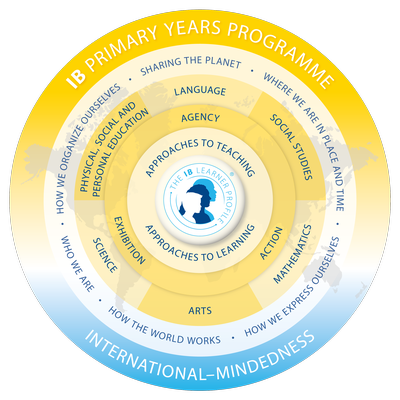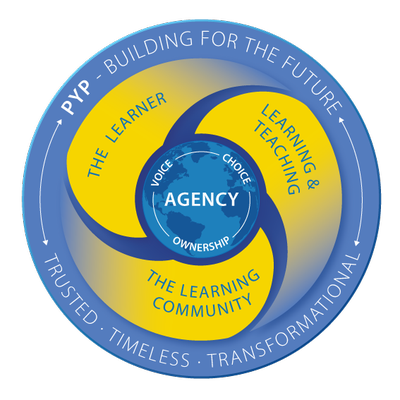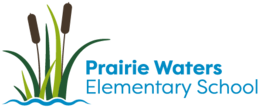About the Primary Years Programme
Prairie Waters is proud to deliver the Primary Years Programme (PYP) to our students. This programme provides a framework through which teachers can structure the delivery of the Alberta curriculum in a meaningful, inquiry-based and consistent approach across all of our grades. While engaged in this programme, students are provided with ongoing opportunities to develop a variety of attributes and skills through their inquiries. Of critical importance to this approach is that the students are actively engaged in their inquiries and that they are making meaningful connections from their learning to the world around them. As our students progress through their years in the programme, they also begin to see that they are able to contribute to their communities - school, family, local, national and international - on many levels and take action to affect change.
The Mission
The International Baccalaureate aims to develop inquiring, knowledgeable and caring young people who help to create a better and more peaceful world through intercultural understanding and respect.
To this end the organization works with schools, governments and international organizations to develop challenging programmes of international education and rigorous assessment.
These programmes encourage students across the world to become active, compassionate and lifelong learners who understand that other people, with their differences, can also be right.
Central to the PYP is the goal of developing students who are internationally minded, lifelong learners & inquirers, knowledgeable & skilled in many ways, who possess strong values & ethics and who are empowered to make a difference.
At Prairie Waters Elementary, students in our Preschool Intervention Program to Grade 5 are all involved in the Primary Years Programme. The PYP focuses on the development of the whole child as it strives to prepare students to be world citizens and lifelong learners. The curriculum is designed to meet the academic, social, physical, emotional and cultural needs of all young students.
There is a common language what we share within the PYP and we encourage you to utilise this language at home with your children to reinforce the importance of the elements of the Primary Years Programme. It will also provide you with an opportunity to discuss and understand the knowledge that your child is developing while they are at school.

Transdisciplinary Themes
Using the Alberta Education Programs of Study as our guide, curriculum is developed around six (6) Transdisciplinary Themes that help teachers and students explore knowledge and concepts on a broader spectrum. The themes are repeated at each grade, however each grade level explores a different aspect of each theme. The themes are global in perspective and explore the commonalities of human experience:
- Who we are
- Where we are in place and time
- How we express ourselves
- How the world works
- How we organize ourselves
- Sharing the planet
Attributes of the Learner Profile
The IB Learner Profile is the IB mission statement translated into a set of learning outcomes for the 21st century. The Learner Profile consists of 10 attributes that we value here at PWE in our staff, students, and community members. This is what we strive for every member of our learning community to “be”
|
Inquirer |
They develop their natural curiosity. They acquire the skills necessary to conduct inquiry and research and show independence in learning. They actively enjoy learning and this love of learning will be sustained throughout their lives. |
|
Knowledgeable |
They explore concepts, ideas and issues that have local and global significance. In so doing, they acquire in-depth knowledge and develop understanding across a broad and balanced range of disciplines. |
|
Thinkers |
They exercise initiative in applying thinking skills critically and creatively to recognize and approach complex problems, and make reasoned, ethical decisions. |
|
Communicators |
They understand and express ideas and information confidently and creatively in more than one language and in a variety of modes of communication. They work effectively and willingly in collaboration with others. |
|
Principled |
They act with integrity and honesty, with a strong sense of fairness, justice and respect for the dignity of the individual, groups, and communities. They take responsibility for their own actions and the consequences that accompany them. |
|
Open-Minded |
They understand and appreciate their own cultures and personal histories, and are open to the perspectives, values and traditions of other individuals and communities. They are accustomed to seeking and evaluating a range of points of view, and are willing to grow from the experience. |
|
Caring |
They show empathy, compassion and respect towards the needs and feelings of others. They have a personal commitment to service, and act to make a positive difference to the lives of others and to the environment. |
|
Risk-Takers |
They approach unfamiliar situations and uncertainty with courage and forethought, and have the independence of spirit to explore new roles, ideas and strategies. They are brave and articulate in defending their beliefs. |
|
Balanced |
They understand the importance of intellectual, physical and emotional balance to achieve personal well-being for themselves and others. |
|
Reflective |
They give thoughtful consideration to their own learning and experience. They are able to assess and understand their strengths and limitations in order to support their learning and personal development. |
Key Concepts
The seven (7) key concepts in the PYP help design our transdisciplinary curriculum. They allow students to make connections across and within the core subjects of the Alberta curriculum. These key concepts are presented in the form of key questions, and it is these questions – used flexibly by the teacher and students – that shape each unit, giving it direction and purpose.
- Form ~ What is it like?
- Function ~ How does it work?
- Causation ~ Why is it as it is?
- Connection ~ How is it linked to other things?
- Change ~ How is it transforming?
- Perspective ~ What are the points of view?
- Responsibility ~ What are our obligations?
Approaches to Learning
Within their learning throughout the programme, students are introduced to, taught and apply a set of skills that transcend all of the subject areas. These skills are valuable, not only in the Units of Inquiry, but also for any teaching and learning that goes on within the classroom, and in life outside the school.
- Thinking Skills
- Social Skills
- Communication Skills
- Self-Management Skills
- Research Skills
Action
In the PYP, it is believed that education must extend beyond knowledge that is gained to include not only socially responsible attitudes but also thoughtful and appropriate action. Students are encouraged to follow through with a successful inquiry that leads to responsible action, initiated by themselves, or a group of peers as a result of their learning process. Action should be encouraged not only within the walls of the school, but also outside in the greater communities – home, local, national, and global. In order to implement effective action within our students:
- It should be modeled by the adults both in the school and home community
- It should be voluntary and involve students in exercising their own initiative
- It is best grounded in the students’ concrete experiences
- It is most beneficial to the students when they are able to witness the outcomes
Agency
Agency ensures that students use their own initiative and will, and take responsibility and ownership of their learning. They direct their learning with a strong sense of identity and self-belief. By developing a sense of agency, students take initiative, express interest and wonderings, make choices and are aware of their learning goals. Prairie Waters staff recognize students' capabilities through listening, respecting and responding to their ideas. They make thoughtful considerations and decisions with an emphasis on relationships, dialogue and respect for one another.

Unit of Inquiry – UOI
Units within the grades that explore the Transdisciplinary Themes. Units typically last 4-6 weeks. Students in grades 1-5 participate in 6 units per year- 1 for each theme. Our Kindergarten students participate on 4 units per year. They will inquire into a central idea, use lines of inquiry to help give the unit scope, develop skills, attitudes and knowledge, and participate in formative and summative assessments.
Central Idea
This is the statement that guides the whole unit. It must be conceptually based, globally true, not value-laden, and deep enough that it invites inquiry and exploration amongst all of the students.
Program of Inquiry - POI
All of the Units of Inquiry (UOI’s) from each grade level constitute the school’s Program of Inquiry (POI).
Inquiry-Based Learning
Benjamin Franklin once said, “Tell me and I forget, teach me and I may remember, involve me and I learn.” The last part of this statement is the essence of inquiry-based learning. Inquiry, interpreted in the broadest sense, is the process initiated by the students or the teacher that moves the students from their current level of understanding to a new and deeper level of understanding through hands-on, experiential learning engagements, rather than a ‘sit, get, repeat back’ model. In an inquiry-based method of teaching, students are co-participants in driving the learning that takes place in the room. Inquiry in the class may look like:
- Exploring, wondering and questioning
- Experimenting and playing with possibilities
- Making connections between previous learning and current learning
- Making predictions and acting purposefully to see what happens
- Collecting data and reporting findings
- Clarifying existing ideas and reappraising perceptions of events
- Deepening understanding through the application of a concept
- Making and testing theories
- Researching and seeking information from a variety of sources
- Taking and defending a position
- Solving problems in a variety of ways
Action Plan
Being an IB World School requires us to set an action plan. This 5 year plan identifies aspects of the Primary Years Programme that we would like to improve and typically address areas that we identified in our self-study year (2016-2017) and from our IB Evaluation (November 2017). An action plan aligns to parts of our School Education Plan. Find out more HERE.
If you have any questions about the Programme or would like more information, please don't hesitate to get in touch with your child's teacher, or the PYP & Learning Tech Coordinator ~ Jen Friske
